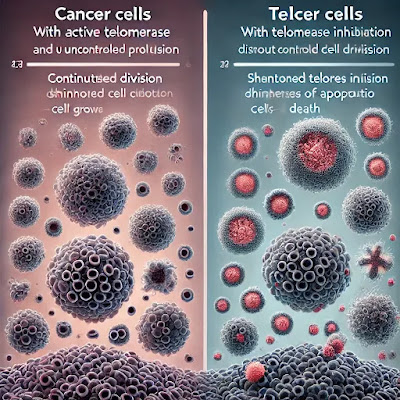The New FDA Approval of Telomerase Inhibitor Imetelstat: A Game-Changer in Cancer Treatment
The New FDA Approval of Telomerase Inhibitor Imetelstat: A Game-Changer in Cancer Treatment
Introduction: A Breakthrough in Oncology
Cancer, a leading cause of death globally, has always been a focus of extensive medical research. Traditional cancer treatments, such as chemotherapy, radiation therapy, and surgery, have had varying degrees of success. However, in recent years, targeted therapies, which focus on specific molecular mechanisms in cancer cells, have revolutionized oncology. Among these targeted therapies, telomerase inhibitors represent a new frontier. In 2024, the U.S. Food and Drug Administration (FDA) approved Imetelstat, a first-in-class telomerase inhibitor, for treating certain blood cancers. This approval marks a significant milestone in cancer treatment.
This article delves into the science behind telomerase inhibition, the clinical trials leading to Imetelstat’s approval, its implications for cancer therapy, and the future prospects of this groundbreaking drug.
Understanding Telomerase: A Key Player in Cancer
Telomerase is an enzyme that plays a critical role in the process of cellular aging and proliferation. At the end of chromosomes, there are structures called telomeres, which protect the DNA from damage during cell division. With each cell division, telomeres shorten, eventually leading to cellular senescence, or the inability of the cell to divide further. Telomerase counteracts this shortening by adding nucleotides to the ends of telomeres, essentially giving cells the ability to divide indefinitely.
While telomerase activity is low or absent in most normal cells, it is highly active in cancer cells. This allows cancer cells to continue dividing uncontrollably, contributing to tumor growth and metastasis. In fact, telomerase is active in approximately 85-90% of all cancers, making it an attractive target for cancer therapy.
Imetelstat: The First FDA-Approved Telomerase Inhibitor
Imetelstat is a novel telomerase inhibitor that targets and inhibits the activity of telomerase, thereby preventing cancer cells from maintaining their telomeres. This leads to gradual telomere shortening, limiting the ability of cancer cells to proliferate. Imetelstat has been in development for over a decade, with numerous preclinical and clinical studies demonstrating its potential to treat a variety of cancers.
On August 16, 2024, the FDA granted full approval for Imetelstat based on the positive results of several pivotal clinical trials. This approval is specifically for the treatment of patients with myelofibrosis (MF) and myelodysplastic syndromes (MDS)—two forms of blood cancer. Both of these diseases are associated with abnormal blood cell production and bone marrow function, leading to a high unmet medical need for new and effective treatments.
Myelofibrosis and Myelodysplastic Syndromes: Understanding the Target Diseases
-
Myelofibrosis (MF):
Myelofibrosis is a rare and serious bone marrow disorder that disrupts the body’s normal production of blood cells. This condition is characterized by the replacement of bone marrow with fibrous tissue, leading to anemia, fatigue, and an enlarged spleen. Current treatments for MF include JAK inhibitors, which help manage symptoms but do not significantly alter disease progression. -
Myelodysplastic Syndromes (MDS):
Myelodysplastic syndromes are a group of bone marrow disorders in which the bone marrow does not produce enough healthy blood cells. This leads to symptoms such as fatigue, infections, and bleeding. MDS can progress to acute myeloid leukemia (AML), a highly aggressive cancer. Treatment options for MDS are limited, and many patients eventually require blood transfusions to manage their condition.
Imetelstat offers new hope for patients with these challenging conditions, particularly those who have failed or are ineligible for other therapies.
Clinical Trials Leading to FDA Approval
The approval of Imetelstat was based on two pivotal Phase III clinical trials, both of which demonstrated its effectiveness in improving overall survival and reducing disease symptoms in patients with MF and MDS.
-
IMerge Trial (MDS):
The IMerge Phase III trial was designed to evaluate the efficacy and safety of Imetelstat in patients with lower-risk myelodysplastic syndromes. In this trial, Imetelstat showed significant improvements in achieving transfusion independence, which is a key indicator of disease control in MDS patients. Many patients treated with Imetelstat were able to stop or significantly reduce their dependence on blood transfusions, a crucial outcome for those with MDS. -
IMbark Trial (MF):
The IMbark Phase III trial evaluated Imetelstat in patients with intermediate-2 or high-risk myelofibrosis who had previously been treated with a JAK inhibitor. The results of this trial demonstrated that Imetelstat improved overall survival and reduced spleen size in patients with advanced MF. This was particularly noteworthy because previous treatments for MF primarily focused on symptom management rather than extending survival.
Both trials showed that Imetelstat has a manageable safety profile, with the most common side effects being cytopenias (a reduction in the number of blood cells), fatigue, and gastrointestinal symptoms. However, the benefits of Imetelstat outweighed the risks for many patients, particularly those with few alternative treatment options.
Mechanism of Action: How Imetelstat Works
Imetelstat is an oligonucleotide (a short DNA-like molecule) that binds to the RNA template of telomerase, preventing it from adding nucleotides to telomeres. By inhibiting telomerase, Imetelstat causes telomeres to progressively shorten in cancer cells. As the telomeres shorten, cancer cells lose their ability to divide and eventually undergo cell death (apoptosis).
What sets Imetelstat apart from other cancer therapies is its ability to target the “immortality” mechanism of cancer cells. While many cancer drugs aim to directly kill rapidly dividing cells, Imetelstat tackles the underlying cause of cancer cell proliferation by preventing them from maintaining their telomeres. This makes it a unique and potentially powerful option for treating cancers that rely on telomerase activity for survival.
Implications for Cancer Treatment
The approval of Imetelstat represents a significant advancement in cancer therapy, particularly for patients with blood cancers like MF and MDS. The ability to target telomerase, a key driver of cancer cell immortality, opens up new avenues for treating cancers that have been difficult to manage with existing therapies.
-
Potential for Combination Therapy:
One of the most exciting aspects of Imetelstat is its potential to be used in combination with other cancer treatments. For example, Imetelstat could be combined with JAK inhibitors (which target the JAK-STAT pathway) to enhance its effectiveness in treating MF. Similarly, combining Imetelstat with hypomethylating agents (drugs that modify DNA) could improve outcomes for patients with MDS. -
Expanding to Other Cancers:
While Imetelstat is currently approved for MF and MDS, ongoing clinical trials are investigating its use in other types of cancer, including acute myeloid leukemia (AML) and solid tumors. Given that telomerase is active in the vast majority of cancers, the potential applications of Imetelstat are broad. -
Addressing Unmet Medical Needs:
Patients with advanced MF and MDS often have limited treatment options, particularly if they fail existing therapies. Imetelstat provides a new option for these patients, offering the possibility of disease modification and improved survival. This is particularly important in a field where many treatments focus solely on managing symptoms rather than altering the course of the disease.
Future Prospects for Imetelstat and Telomerase Inhibition
The approval of Imetelstat is just the beginning for telomerase inhibition as a cancer treatment strategy. Researchers are now exploring ways to optimize the use of Imetelstat, including the development of biomarkers to identify which patients are most likely to benefit from the drug. In addition, combination therapies with other targeted agents may enhance the effectiveness of telomerase inhibition.
Moreover, as more is understood about the role of telomerase in different types of cancer, it is likely that other telomerase inhibitors will be developed, further expanding the potential of this therapeutic approach.
Conclusion: A New Era in Cancer Therapy
The FDA approval of Imetelstat, the first telomerase inhibitor, marks a major milestone in the field of oncology. By targeting the fundamental mechanism that allows cancer cells to divide indefinitely, Imetelstat offers a novel approach to treating cancers like myelofibrosis and myelodysplastic syndromes. Its potential to improve survival and quality of life for patients with these diseases is significant, and ongoing research may expand its use to other cancers in the future.
As the scientific community continues to explore the role of telomerase in cancer, Imetelstat’s approval signals the beginning of a new era in cancer therapy, one that holds great promise for patients with difficult-to-treat cancers.
Cite this-https://www.ameripharmtimes.in/2024/09/the-new-fda-approval-of-telomerase.html
Search Keywords:- Myelofibrosis new treatments, Cancer cell telomeres, MDS drug therapy, Telomerase inhibitor therapy, Imetelstat FDA approval,
Visit us at: https://www.ameripharmtimes.in




Comments